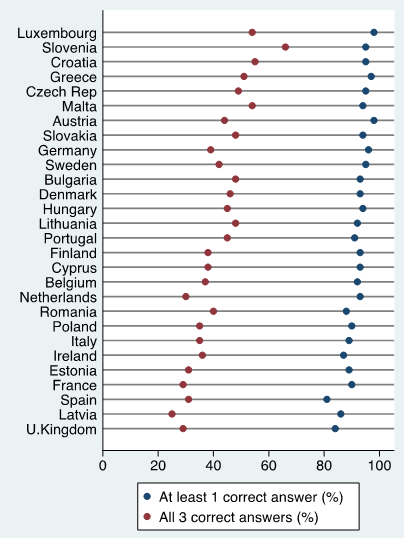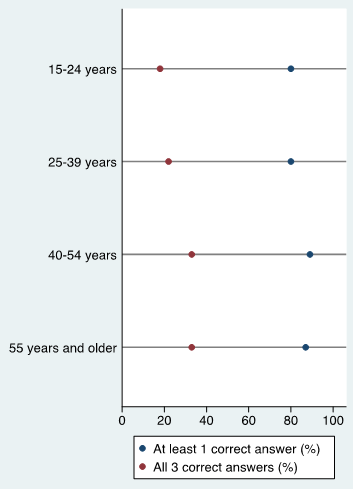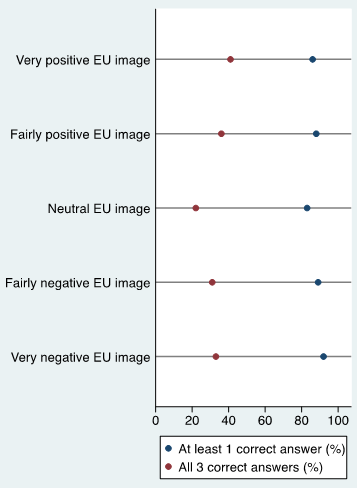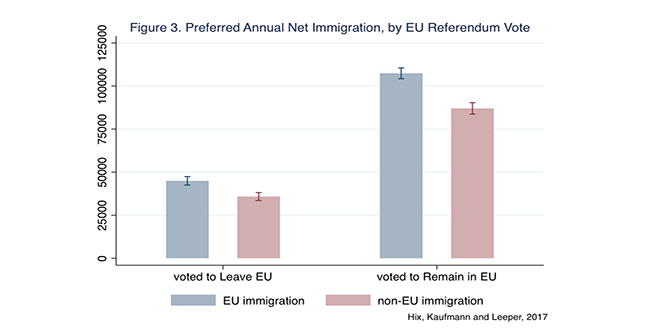 How does knowledge about the EU vary between citizens of EU Member States? Using data from Eurobarometer surveys, Simon Hix writes that respondents from the UK perform worse than citizens from any other state when asked factual questions about the EU. However, he notes that while there is a perception that providing more information about the EU to UK citizens would increase support for the country’s EU membership, there is little evidence for this in the survey data, with those displaying high levels of knowledge being just as likely to hold negative views about the EU.
How does knowledge about the EU vary between citizens of EU Member States? Using data from Eurobarometer surveys, Simon Hix writes that respondents from the UK perform worse than citizens from any other state when asked factual questions about the EU. However, he notes that while there is a perception that providing more information about the EU to UK citizens would increase support for the country’s EU membership, there is little evidence for this in the survey data, with those displaying high levels of knowledge being just as likely to hold negative views about the EU.
There is an on-going argument about whether the UK government should launch an information campaign about the EU ahead of the Brexit Referendum. It is widely assumed that more information about the EU will lead to more support for remaining a member of the EU. Hence, pro-Europeans tend to support an information campaign while anti-Europeans tend to oppose it. Before I get to this debate, let us first ask how much the British public knows about the EU compared to other member states.
One simple way of answering this is to look at the most recent pan-European survey for which data are available: the “standard” Eurobarometer survey (EB83.3) that was conducted in May 2015. The survey interviewed approximately 1,000 people in each of the 28 EU member states, properly sampled, including 1,306 in the UK. To test “knowledge” of the EU the survey asked:
“For each of the following statements about the EU could you please tell me whether you think it is true or false [Options: True / False / Don’t Know]
1. The EU currently consists of 28 Member States,
2. The members of the European Parliament are directly elected by the citizens of each Member State,
3. Switzerland is a Member State of the EU.”
The correct answers, of course, are True, True, and False! Figure 1 shows two ways of analysing the responses: 1) the percentage of citizens in each member state who answered at least one question correctly (in blue); and 2) the percentage who answered all three questions correctly (in red).
Figure 1: Knowledge of the EU, by Member State
Note: The order of the states reflects an average of the two measures. Data from May 2015 Eurobarometer.
Averaged across the two measures, these data suggest that British people are less knowledgeable about the EU than the citizens of any other member state: 84 per cent of the British public could answer at least 1 of the three questions correctly (only Spain was lower on this measure), and only 27 per cent of the British public could answer all three questions correctly (only Latvia was lower on this measure).
Interestingly, the French are also poorly informed about the EU, although their knowledge is slightly higher than the British. Germans, in contrast, are much more knowledgeable: with 96 per cent answering at least 1 question correctly, and 39 per cent answering all three questions correctly. Another interesting contrast is Denmark, which joined the EU at the same time as the UK, in 1973, but has had several EU-related referendums, and associated information campaigns, since then: 93 per cent of Danes answered at least 1 questions correctly, and 46 per cent answered all three questions correctly.
With the inclusion of “Britain’s relations with Europe” in “citizenship” education in the National Curriculum, one might assume that younger people are better informed than older people. However, Figure 3 shows that this is not in fact the case. For example, only 18 per cent of 15-24 years olds could answer all three questions correctly as compared to 33 per cent of people over the age of 40. Perhaps more about the EU should have been taught at school!
Figure 2: Knowledge of the EU in the UK, by age group
Note: Data from May 2015 Eurobarometer.
In general, looking at other demographics, more highly educated people in the UK are more likely to answer the questions correctly, as are people in higher social groups. In other words, an information campaign about how the EU works and what the EU does might enable younger people, people on lower incomes, and less well-educated people to make a more informed choice in the referendum.
But, will providing more information about the EU make people more pro-European, as many Eurosceptics fear? The evidence from this survey does not support that assumption. Another question in the May 2015 Eurobarometer survey asked people about whether they had a positive or negative image of the EU:
“In general, does the EU conjure up for you a very positive, fairly positive, neutral, fairly negative or very negative image? [Options: Very positive / Fairly positive / Neutral / Fairly negative / Very negative / Don’t Know]”
Figure 3: Attitude towards the EU, by image of the EU
Note: Data from May 2015 Eurobarometer.
It is not possible with these data to clearly identify whether providing more information about the EU leads people to be more pro-EU or anti-EU, or whether having strong views on the positive or negative side leads people to be better informed.
Nevertheless, as Figure 3 shows, there is suggestive evidence that British people who have a more negative image of the EU are just as likely to be as well informed about the EU as people who have a more positive image of the EU: 86 per cent of British people who have a ‘very positive EU image’ answered at least 1 question correctly, compared to 92 per cent of people who have a ‘very negative EU image’. Also, 41 per cent who have a ‘very positive EU image’ answered all three questions correctly, compared to 33% who have a ‘very negative EU image’. In other words, learning more about the EU may be just as likely to lead people to have a negative view of the EU as a positive view.
Please read our comments policy before commenting.
Note: This article gives the views of the author, and not the position of EUROPP – European Politics and Policy, nor of the London School of Economics.
Shortened URL for this post: http://bit.ly/1YxtcM4
_________________________________
 Simon Hix – LSE
Simon Hix – LSE
Simon Hix is Harold Laski Professor of Political Science at the London School of Economics and Political Science and Senior Fellow on the ESRC’s UK in a Changing Europe programme.







When theVote was taken people were only aware that they were voting to join the EEC an Economic trading area but in actual fact the people were not aware of that enclosed in that the document. Was the Treaty of Rome, which was never explained to the people and as such should have been declared null and void . I was asked to canvass at that time but refused on the grounds no one would give details of this ,I believe that there is recording of Micheal Foote
& Heath on this matter ,which I suggest you listen to
I Still think the same